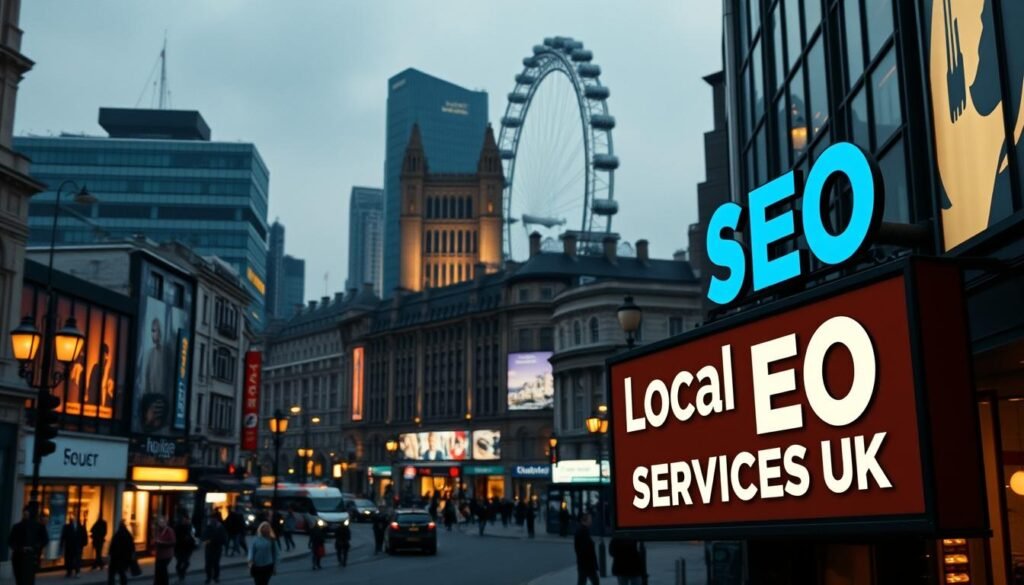Did you know over 46% of all Google searches look for local info? This shows how crucial local SEO is for small businesses. By using Local SEO Services UK and improving their Google Business Profile (GBP), they can boost their local presence. This helps them connect with people in their area.
In a crowded digital market, using local SEO is key. It helps businesses stand out and build strong ties with local customers. This is vital for staying ahead and keeping customers coming back.
Key Takeaways
- Local SEO is vital for small businesses to enhance their visibility.
- Optimising your Google Business Profile can significantly improve local engagement.
- Nearly half of all Google searches are focused on local results.
- Smart local SEO strategies can help businesses compete against national brands.
- Higher foot traffic results from effective local SEO practices.
- Building strong relationships in the community fosters customer loyalty.
Understanding the Importance of Local SEO
Today, how we shop has changed a lot. More people use the internet to find what they need. This means businesses must stand out more than ever.
About 98% of shoppers look for local options before buying. This shows how vital it is for small businesses to be seen locally.
The Shift in Consumer Behaviour
Now, people use their phones to find what they need fast. They often choose local businesses that show up in their searches. This makes having a strong online presence key.
Using local SEO helps businesses meet these needs. It boosts their chances of making sales.
Why Local SEO is Essential for Small Businesses
Local SEO is a game-changer for small businesses. It helps them compete with bigger companies. By focusing on local searches, they can reach their audience better.
Using tools like Google Business Profile makes them more visible. This not only attracts customers but also builds community ties. It’s a way to create lasting relationships.
The Power of Google Business Profile (GBP)
The Google Business Profile (GBP) is key for local search rankings. It’s more than a tool; it’s a chance for businesses to get seen more. A good GBP can lead to more map directions, website visits, and customer interaction.
What is Google Business Profile?
Google Business Profile is free and lets businesses manage their online presence. It shows important info like location, contact details, and services. Optimising it boosts visibility and helps engage with potential customers through reviews and updates.
Optimising Your GBP for Maximum Visibility
To get the most from GBP, setting it up right is crucial. Important steps include:
- Providing accurate business info like name, address, and phone number.
- Picking the right categories for your services.
- Uploading top-notch images of your business.
- Keeping content fresh with updates on promotions, events, or new stuff.
It’s also vital to interact with customers through reviews. Positive reviews from happy customers can make your business look better. Studies show businesses with great images get 42% more map directions. This shows how GBP optimisation can really help.
Local SEO Services UK: Tailored Strategies for Success
In today’s competitive world, businesses need effective local SEO strategies. A good local SEO plan includes many elements. These work together to boost visibility and attract more customers.
Offering services that fit the needs of local people can really help. This approach can increase engagement and build loyalty.
Elements of an Effective Local SEO Strategy
A solid local SEO strategy has several key parts. These include optimised Google Business Profiles and specific keywords for your area. It also includes accurate local citations.
These elements help your business show up online more easily. They make it simpler for people to find you. Regularly checking what your competitors are doing helps you stay ahead.
Customisation for Local Audiences
Customisation is crucial in local SEO. Creating unique pages for different areas and using local content is key. This makes your business more relevant to the local community.
Keeping your content up-to-date with local events can also help. It builds connections with the people around you. This makes your business more relatable and increases the chance of people visiting.
Competitor Analysis: Your Secret Weapon
Knowing your online competition is key for small businesses wanting to boost their local SEO. A detailed competitor analysis gives you insights into who your rivals are and how they work online. It’s about finding those who also want your audience’s attention.
Identifying Your Local Competitors
Starting a competitor analysis means finding local rivals in your field. Sometimes, they’re not who you think. Use incognito Google searches with the right keywords to find them. Note those close to you, as they might take your customers.
This step helps you see all your competition. It gets you ready for planning your next move.
Dissecting Competitor Strategies
Looking at what your competitors do can teach you a lot. Check their on-page SEO like webpage copy and titles. See how they use Google Business Profile (GBP) to improve your own presence.
Look for patterns in their content and reviews. This shows you their strengths and weaknesses. It helps you create better strategies and avoid local threats.

Local Citations and Their Role in Local SEO
Local citations are key in local SEO. They include a business’s name, address, and phone number (NAP). These citations tell search engines a business exists, making it more visible and improving local rankings. It’s vital to keep NAP the same everywhere online to build trust with customers.
Understanding NAP Accuracy
Keeping your business’s NAP the same everywhere is called NAP consistency. If it’s not, search engines might get confused. This can hurt your rankings. It’s important to keep your details right on sites like Yelp and Yellow Pages to be seen as reliable.
Building Trust with Local Citations
Local citations help improve your search rankings and build trust with locals. Search engines see consistent citations as proof of a business’s trustworthiness. Tools like Whitespark or BrightLocal help track how well your citations are doing.
Creating Engaging Local Content
Making local content is key for businesses wanting to attract local customers. Content that speaks to the community’s interests and stories builds trust. As people look for brands that get their surroundings, local content is a big win.
The Importance of Hyperlocal Content
Hyperlocal content makes a brand more relevant by meeting community needs. It talks about neighbourhood events and local insights. Brands that focus on this become local leaders. This leads to more customer interaction and loyalty, boosting repeat business.
Examples of Effective Local Content Strategies
Strong local content strategies help businesses connect with their audience. Here are some good ways to do it:
- Blogging about local events, festivals, or news shows community spirit.
- Creating how-to guides for local challenges or interests helps solve problems.
- Developing local resource lists links the community to important services and businesses.
- Featuring customer stories shows the brand’s dedication to its community.
- Utilising social media to share local news encourages community involvement.
Using these content marketing strategies, businesses can really make a difference in their community.

Conclusion
In today’s market, local SEO is key. A good strategy includes optimising Google Business Profiles and ensuring NAP accuracy. It also means creating content that speaks to the local community.
Small to medium-sized enterprises that use these tactics see better visibility. They also build stronger ties with their community. This is crucial in a world where big brands are everywhere.
Local businesses need to use their unique position to their advantage. Insights from competitor analysis and local citations can give them a big edge. This leads to better customer relationships and growth.
Thriving locally is more than just being online. It requires a thoughtful approach to local SEO. By focusing on these strategies, businesses can connect with their audience and grow in their community.
Conclusion: Your Final Guide to Local SEO Success with GBP
What is local SEO and why is it important for small businesses?
Local SEO helps businesses show up more in local search results. This makes it easier for people to find them. It’s key for small businesses to stand out against bigger brands and attract local customers.
How does Google Business Profile (GBP) influence local search rankings?
GBP is vital for local search rankings. It gives search engines and customers the right business info. An optimised GBP boosts visibility, map clicks, and website visits, helping businesses earn more.
What elements should be included in an effective local SEO strategy?
An effective local SEO strategy includes an optimised GBP and specific keywords. It also involves local citations and engaging content. Regularly checking competitors helps businesses spot chances to get better.
How can businesses identify their local competitors?
Businesses can find local competitors by doing incognito Google searches. This shows who they’re up against online, which might not be the same as their traditional rivals.
What are local citations and why do they matter?
Local citations mention a business’s name, address, and phone number online. They prove the business exists and boost local SEO rankings. This builds trust and credibility with local customers.
How can businesses create engaging hyperlocal content?
Businesses can make engaging hyperlocal content by blogging about local events. They can also create guides or lists for the community. This helps them gain authority and trust with local customers.
Why is consistent NAP accuracy important?
Keeping NAP (name, address, phone number) accurate online builds trust. It’s crucial for businesses aiming at local customers. Wrong info can confuse people and hurt a business’s local search ranking.
What role does competitor analysis play in local SEO?
Competitor analysis is key in local SEO. It lets businesses see how their rivals do online. By studying competitors’ SEO and GBP, businesses can find ways to improve their own strategies.




